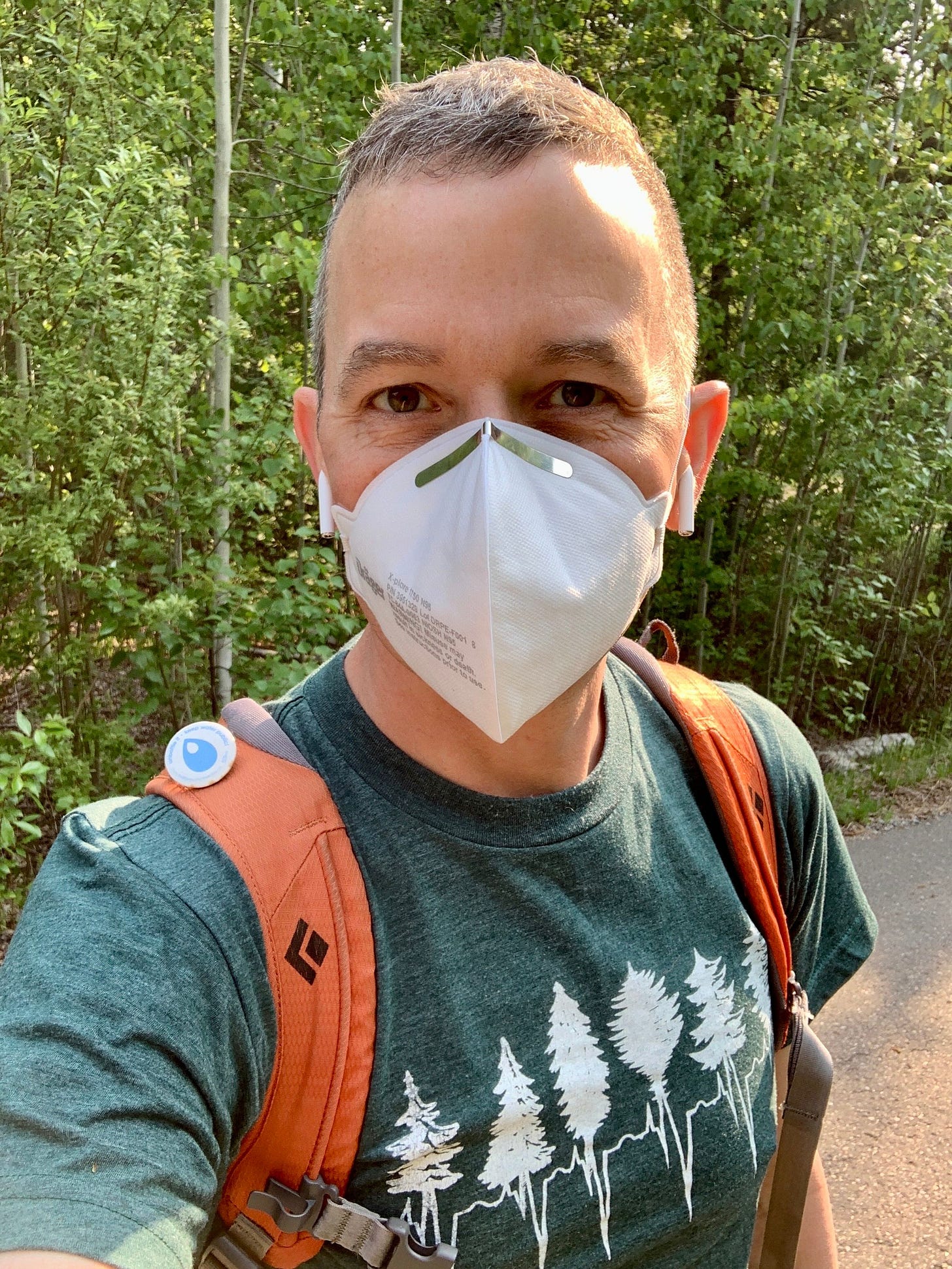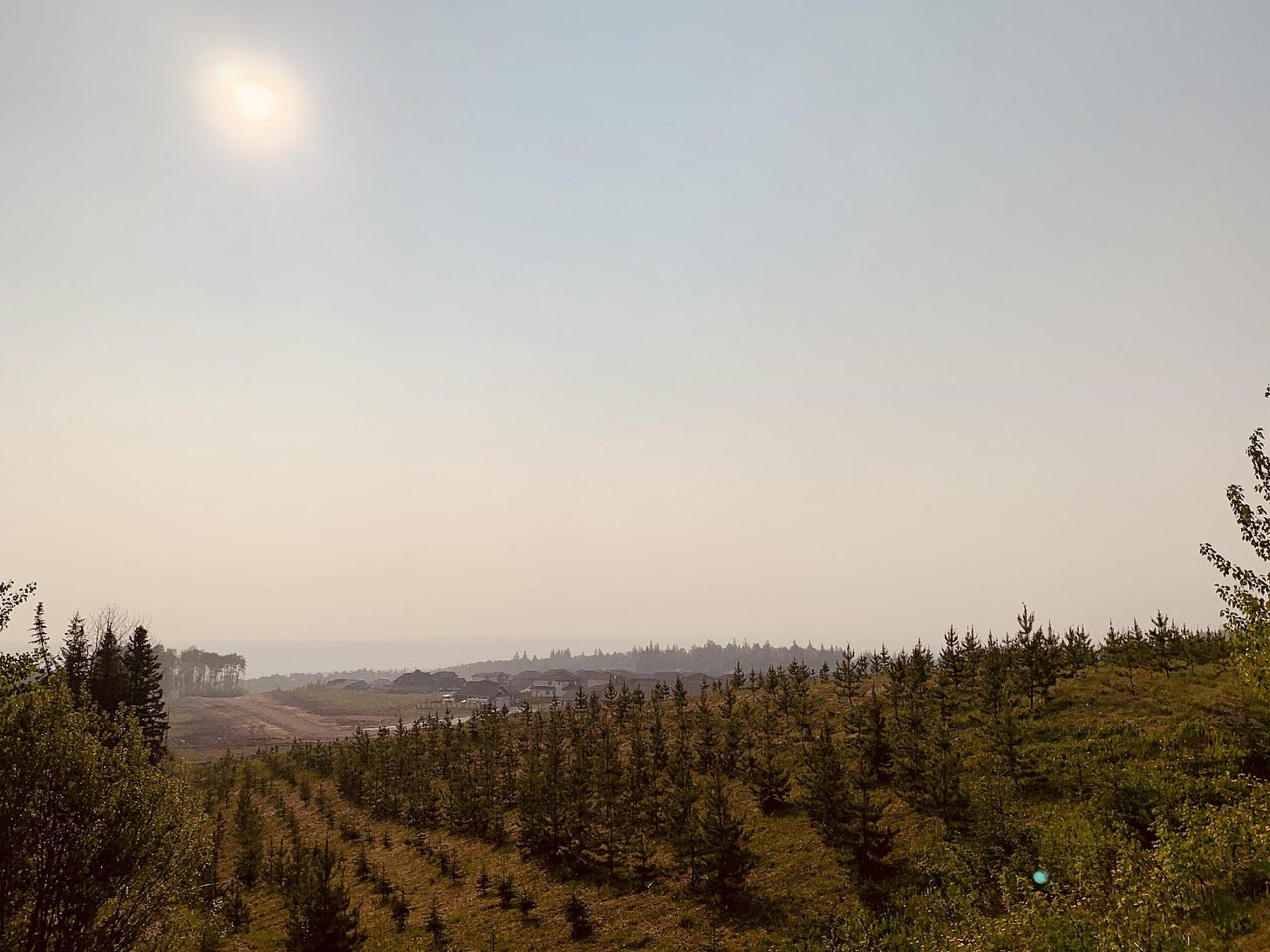Shifting baselines
We shouldn't get used to this. Plus: I need your help with lilacs!
Andrew here! On Wednesday I shared some tweets from Dezene Huber of UNBC about the wildfire smoke and how quickly we have gotten used to it and why that’s a problem. He’s been kind enough to expand his thoughts into a guest post for today’s newsletter, which you’ll find below. But first…
Help me with lilacs!
A little request: If you’ve followed me for a bit you know I am a fan of lilacs in the spring! I’m hoping to write a little something about them so if you have your own thoughts on lilacs and spring — memories, photos, a tattoo — that you’d be willing to have printed please help me out by replying to this email or contacting me elsewhere. Thanks!
Shifting baselines
By Dezene Huber
I walk up the hill to my job at UNBC most weekday mornings – rain, snow, sun, wind, warmth, or cold. Monday 15 May 2023 was no exception to that rule. But what was exceptional was the heat in BC’s Central Interior. The day before we had gone past the 30ºC mark and it hadn’t cooled off much at night. That morning felt a lot like August.
Something else also felt, or rather smelled, like August – wildfire smoke in the air. Like a lot of others these days, I happened to have an N95 mask in my backpack, so I put it on for the walk. Halfway up the hill it dawned on me that my having a smoke-filtering mask at the ready was an unhappy convergence of two phenomena that are going to define our future for decades to come. I happened to have a mask at the ready due to the conservation and biodiversity crisis that sparked a global pandemic. And I was wearing the N95 outside due to climate change-charged fires that were blanketing Prince George in smoke.
While most of us living on the west end of North America have come to expect the smell of smoke during our summers, it hasn’t always been that way. But is it easy to forget that? Those of us who have made 25 or more trips around the sun know that this is not normal. But honestly, does the new abnormal sometimes seem normal? And what about children growing up right now? They literally know nothing different. The tendency to take current conditions and extrapolate them backward is something that Dr. Daniel Pauly, a fisheries scientist at UBC, called the Shifting Baseline Syndrome in a short (one page! read it!) paper almost 30 years ago, and it’s more relevant than ever.
I often bring up this paper in courses that I teach at UNBC because, unfortunately, most of my courses end up in discussions of biodiversity loss, climate change, and the interaction between the two. Most of my students have grown up in the midst of smoky summers and a background of biodiversity loss.
This is how Pauly summarizes it:
Essentially, (Shifting Baseline Syndrome) has arisen because each generation of fisheries scientists accepts as a baseline the stock size and species composition that occurred at the beginning of their careers, and uses this to evaluate changes. When the next generation starts its career, the stocks have further declined, but it is the stocks at that time that serve as a new baseline. The result obviously is a gradual shift of the baseline, a gradual accommodation of the creeping disappearance of resource species, and inappropriate reference points for evaluating economic losses resulting from overfishing, or for identifying targets for rehabilitation measures.
While Pauly was writing about fisheries scientists, this is relevant to all of us because it is so dangerous. Shifting baseline syndrome plays into the hands of those in whose interests it is to maintain the status quo. If enough of us say, “Well, this is just how it is… hasn’t it always been pretty much like this?” there will no change. On our current trajectory, we can hardly afford that attitude.
Several other sights greeted me as I walked up the hill in the hot smoke. The first was the morning rush of traffic – mostly single-occupant vehicles – along Highway 16 at Tyner that I navigate every morning. The second was a (lack of a) view of the Rockies, but a good view of one of the massive clear-cut, vehicle centric, unaffordable-huge-house communities being hacked out of the forests on Cranbrook Hill. These are the choices that we make as residents of this city. They are choices that our elected officials make and enable, knowing that they are the choices that will provide some quick and easy revenue – at least in the near-term.
Further up the hill, as I approached the curve in the path that enters the woods near the university, I was reminded of choices that my institution is also making. UNBC bills itself – generally with very good reason – as Canada’s Green University™. Many of our degree programs and much of our research is tuned in a green direction. The faculty, staff, and administration at UNBC authentically care more about the environment than I’ve experienced at any other university. While UNBC wasn’t billed with this tagline when I started my job, that ethos was a big reason that I chose to work here and why I continue to teach and do research with my students and colleagues.
UNBC has a Campus Master Plan, which is a good thing for any large institution entrusted stewarding a lot of land. Part of that master plan is the Land Trust. And a big part of the land trust discussions right now center on the blue portion of this map labelled “Future Land Trust Opportunity.”
What do things look like on the ground in that “opportunity”? Yesterday I stood at about where the “P” is in the words “Part of…” and took this pano:
The “opportunity” is a forest that provides a lot of ecosystem services to our campus community, to our city, and beyond. First, it harbors substantial biodiversity plant, fungal, insect, amphibian, bird, and mammal biodiversity. There is a mineral seep in blue “opportunity" area that attracts large mammals. You will find western toads throughout the stand. There are flowering plants and nesting habitat that support native pollinators. There are trails throughout that are used by Prince George residents year-round for walking, skiing, and biking. It is a nice quiet place to just meditate for awhile surrounded by bird song. In the heat of the summer (or the heat of May) it is a cool respite as each tree’s transpiration acts like several air conditioners. Walking into the forest envelops you in the smell of Douglas-fir, spruce, and birch. And, relevant to the climate-induced fire smoke around us, it’s part of a carbon sink that is being eaten away by ongoing development into our forests rather than development as bonafide, affordable infill.
Unfortunately that forest also represents a quick money-making development opportunity for UNBC, much like the developments further down the hill have done for the city. Once that forest is gone – once many of the forests on Cranbrook Hill are gone and its slopes are covered in mostly unaffordable housing and roads, our baseline will shift as we forget what was here. But the laws of nature won’t forget, and temperatures will continue to climb and the spring-summer-autumn burning will grow in size and frequency.
As we all inhale immolated trees this summer and beyond, let’s think about how our city, our businesses, and our institutions can choose to make change. A new study estimates that over a third of the fires in western North America are due to emissions from the 88 largest oil and gas and cement companies. Stop and read that sentence again.
When we read statistics like that it’s obvious that we have choices to make. We can continue to choose to remove carbon-sequestering, biodiverse habitat for the sake of mainly unaffordable, car-strewn sprawl. Or we can blaze a new trail and choose to envision and create a better Prince George that helps to turn these tides, becomes a more livable and equitable community, and that is an example of a positive transition for other cities our size.
Dezene Huber is an insect ecologist and professor at UNBC
Quick news:
Campfire ban starts today as the region remains at risk for new blazes.
Prince George "hub" focused on repeat violent offenders up and running.
Prince George lost seven lives to toxic drugs in April, 16 in Northern Health: coroner.
Northern B.C. Crossfit competition being held in Prince George in early June.
That’s it for this week! Here’s hoping the smoke clears and we can have something of a weekend. I don’t know if I’ll be back Monday or if it will wait for Tuesday so you’ll just have to be surprised.
Northern Capital News is a free, daily newsletter about life in Prince George. Please consider subscribing or, if you have, sharing with someone else.
Send feedback by replying to this email. Find me online at akurjata.ca.






